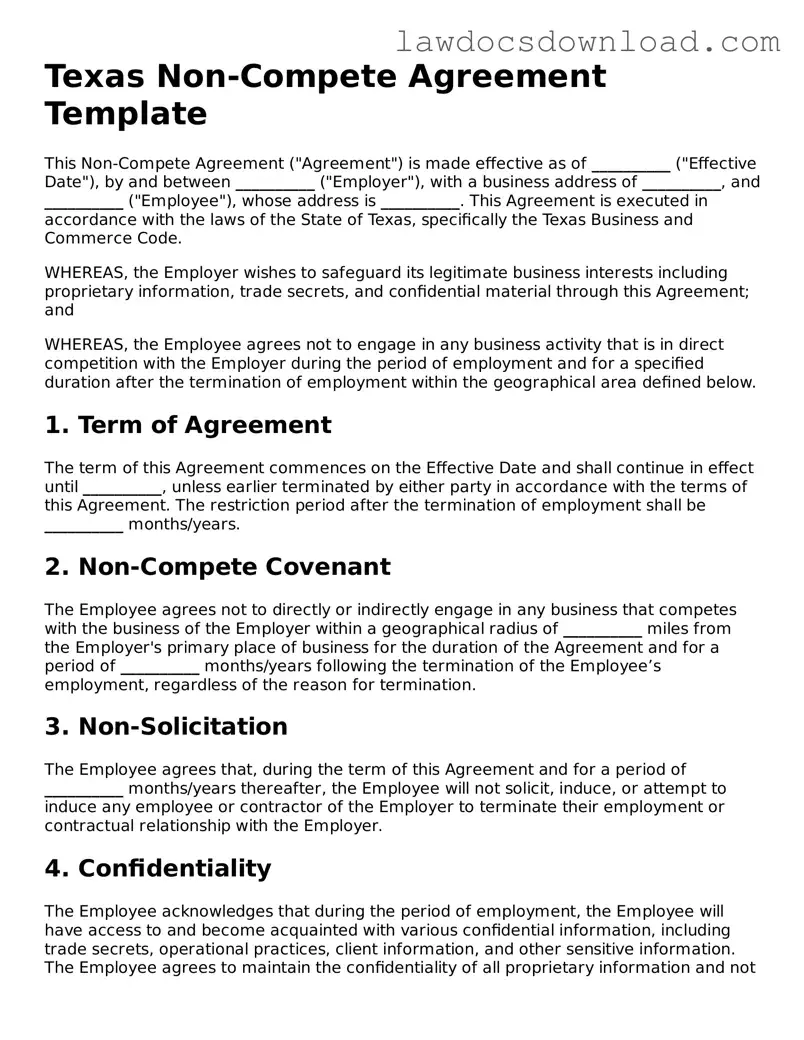Texas Non-Compete Agreement Template
This Non-Compete Agreement ("Agreement") is made effective as of __________ ("Effective Date"), by and between __________ ("Employer"), with a business address of __________, and __________ ("Employee"), whose address is __________. This Agreement is executed in accordance with the laws of the State of Texas, specifically the Texas Business and Commerce Code.
WHEREAS, the Employer wishes to safeguard its legitimate business interests including proprietary information, trade secrets, and confidential material through this Agreement; and
WHEREAS, the Employee agrees not to engage in any business activity that is in direct competition with the Employer during the period of employment and for a specified duration after the termination of employment within the geographical area defined below.
1. Term of Agreement
The term of this Agreement commences on the Effective Date and shall continue in effect until __________, unless earlier terminated by either party in accordance with the terms of this Agreement. The restriction period after the termination of employment shall be __________ months/years.
2. Non-Compete Covenant
The Employee agrees not to directly or indirectly engage in any business that competes with the business of the Employer within a geographical radius of __________ miles from the Employer's primary place of business for the duration of the Agreement and for a period of __________ months/years following the termination of the Employee’s employment, regardless of the reason for termination.
3. Non-Solicitation
The Employee agrees that, during the term of this Agreement and for a period of __________ months/years thereafter, the Employee will not solicit, induce, or attempt to induce any employee or contractor of the Employer to terminate their employment or contractual relationship with the Employer.
4. Confidentiality
The Employee acknowledges that during the period of employment, the Employee will have access to and become acquainted with various confidential information, including trade secrets, operational practices, client information, and other sensitive information. The Employee agrees to maintain the confidentiality of all proprietary information and not to disclose it to any third party during or after the term of their employment, unless required by law.
5. Remedies
In the event of a breach or threatened breach of this Agreement by the Employee, the Employer shall be entitled to seek equitable relief, including injunction and specific performance, in addition to any other remedies available under law. The Employee acknowledges that monetary damages alone would not be an adequate remedy for the breaches of this Agreement.
6. Governing Law
This Agreement shall be governed by and construed in accordance with the laws of the State of Texas, without giving effect to any choice or conflict of law provision or rule.
7. Entire Agreement
This Agreement constitutes the entire agreement between the parties with respect to the subject matter herein and supersedes all prior or contemporaneous agreements, whether written or oral. Any amendments to this Agreement must be in writing and signed by both parties.
8. Acknowledgment
By their signatures below, the parties acknowledge that they have read, understood, and agreed to the terms of this Texas Non-Compete Agreement as of the Effective Date written above.
Employer Signature: __________ Date: __________
Employee Signature: __________ Date: __________

